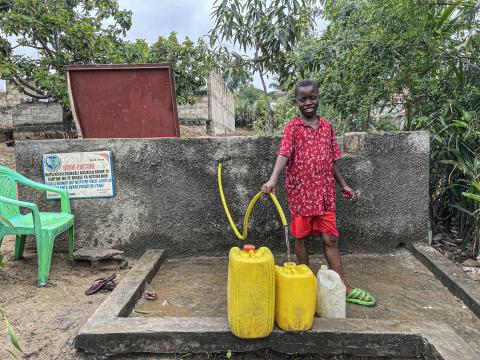DR Congo: Children Spared From Danger Thanks to World Vision's Drinking Water Supply in Maluku

By Didier Nagifi, Communications Officer
World Vision DRC has just provided the community of Maluku with access to drinking water in the commune of Maluku, located in the city of Kinshasa in the Democratic Republic of Congo.
The goal of this project is to enhance the well-being of children by granting 7,100 people access to clean drinking water.
This initiative is being implemented in a context where communal services do not sufficiently meet the water needs of the community. As a result, children and households are exposed to risks such as drowning and traffic accidents when they have to travel longer distances to fetch water.
To address the water problem in the Monaco neighborhood, World Vision has constructed 7 solar-powered standpipes. In order to ensure the sustainability of this project, World Vision has also established a water and infrastructure management committee. This committee is equipped with maintenance tools and spare parts to provide initial intervention in case of any breakdowns.
"In 2020, we acquired a fund from World Vision Hong Kong that enabled us to drill a water well at the Baptist church in Maluku. This water borehole is 100 meters deep and allows us to distribute water over a distance of around 6 kilometers in 7 standpipes and 1 105 m3 reservoir," explains Jimmy Safari, Wash Specialist with World Vision DRC.
This work has had an impact on the life of this community, as women and girls no longer have to walk long distances to fetch water. Children are also no longer exposed to the danger of crossing roads or drinking unsafe water, which puts them at risk of water-borne diseases.
"We had problems getting water, we had to go a long way to fetch water, we had to climb hills, we had to cross big roads, there was grass and ravines. Even so, the water we drew was very dirty, and we drank it because we had no choice. But since World Vision gave us water, we are safe, we drink drinking water, the water wells are close to the house and the children get to school on time", says Gisèle, a member of the community.
"Since World Vision has given us water, we no longer have stomachaches, we no longer arrive late at school, and the money our parents used to spend on the hospital is now used to pay our school fees, thank you World Vision", rejoices Dieuleveut, 11, a sponsored child.
As a result of this project, some schools in Maluku have been supplied with drinking water. Children arrive at school on time, and the distance between them and water points has been reduced.
"World Vision brought us a borehole next to our school. Mrs. Emilie and Mr. Jean fetch 5 jerry cans a day and bring them to school with cups," says Rosiana, an 11-year-old pupil.
World Vision is currently using a solar-powered water pumping system. The water flows continuously, and the inhabitants have access to water at all times.
"We have installed 84 solar panels for pumping water, which also help to preserve the environment, as no CO2 is emitted when the water comes out of the tap," explains Jimmy Safari, Wash Specialist, World Vision DRC.